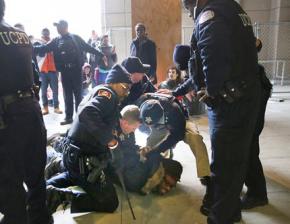U of Chicago’s violent crime
reports on the growing movement to demand that the elite University of Chicago give back to Chicago's impoverished South Side.
MORE THAN 200 students, faculty, workers and community members braved wind chill temperatures of -11 degrees to rally February 1 at the University of Chicago in support of a new trauma center for adults at the university's hospital--and in defense of the right to protest.
On January 27, four protesters staged a sit-in at the new $700 million University of Chicago Medical Center to demand the reopening of an adult trauma center closed since 1988. University police responded with violence, beating the protesters and arresting four people, including a 17-year-old high school student and Toussaint Losier, a member of Graduate Students United at the University of Chicago (GSU).
The incident sparked outrage among the university community. Organizers collected more than 1,500 signatures on a petition to university administrators. "The police seem to have singled out Toussaint Losier for especially harsh treatment," the petition stated. "After choking him with a nightstick, they kept him handcuffed and forced him to lie face-down on cold cement for approximately 10 minutes in sub-freezing weather."

The university attempted to diffuse the situation by announcing a series of "faculty-led dialogues" to address student and community concerns. "As always, we make progress in understanding the issues at hand through a robust exchange of ideas from different perspectives," wrote Provost Thomas Rosenbaum in an email to the university community.
At the solidarity rally on February 1, the university tried to stop media from covering the protest, but ultimately allowed them to cover the event as long as they didn't enter any buildings.
Veronica Morris-Moore, who was arrested on January 27, addressed the rally, noting that while the South Side is often seen as being under the siege of violent crime, "the fact that there is no trauma center [on the South Side] is a violent crime in itself."
The tragic case of Damian Turner, who was killed by gunfire in 2010, shows why. Turner was about two blocks from the University of Chicago Medical Center when he was hit by a stray bullet, but because the hospital has no adult trauma center, he had to be transported 10 miles to another hospital. Sheila Rush, Turner's mother, spoke to the rally, explaining that her son's fate shows the urgency of building the movement for a trauma center--not just to win justice for her son, but for everyone who lives on the South Side.
Michael, a member of the undergraduate group Students for Health Equity, noted that the university's failure to meet the needs of the surrounding community reflected a broad problem of health care injustice. "No society that denies health care because of an inability to pay can call itself just," he said.
PROTESTERS THEN linked arms and marched across campus to the administration building, walking single file up five flights of stairs to deliver the petition and lay flowers for the fallen at the doors of the administrative offices. Outside, people chanted, "They lock me up and beat me, but they still refuse to treat me!" and "Trauma care is a right, not just for the rich and white!"
Organizers announced a community forum--in contrast to the top-down discussions being led by the administration--will take place on Tuesday, February 5 at 6 p.m. in Kemp 107. "We'll continue to fight, continue to protest," said Veronica Morris-Moore, and the crowd erupted in a chant of "We'll be back!"
GSU also issued a statement condemning the university's treatment of the protesters:
The University of Chicago serves as our dwelling, our social center and also our workplace. We are horrified and appalled by how our university's private police force responded to and treated our fellow students and friends. We are equally dismayed by the university administration's continued failure to respond to the call to better serve its community by reinstating a trauma care center...Graduate Students United unflinchingly stands with those involved in the trauma center campaign and affirms that no one should be threatened with or suffer police violence when peacefully protesting in and for their own community.
Whether by their inadequate health care plans for graduate employees, the attempt to bust the nurses' union during the opening of the new hospital, or the complete disregard for the lives of the people who live in the South Side of Chicago, the University of Chicago has made it very clear that its own bottom line is always its first concern.
Organizers know, however, that the only way to win back a much-needed trauma center and to ensure that our right to protest is protected is to build a movement based on a coalition of students, workers and community members.


